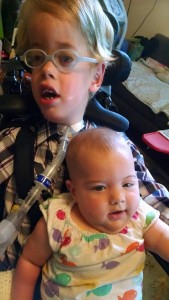Brother and Sister (June 13)
We’ve been working on this post for a while.  It’s another hard one to share, in part because we just want you all to love our kids without worry or exceptions. But we also need to stop tiptoeing around questions about how Ida’s doing, so we thought we’d share what we know at this point.
It’s another hard one to share, in part because we just want you all to love our kids without worry or exceptions. But we also need to stop tiptoeing around questions about how Ida’s doing, so we thought we’d share what we know at this point.
As Ida grows – and she is growing FAST, already having doubled her birth weight to over 18 pounds – it’s wonderful to see her come into her own as a baby with a distinct personality. She could perhaps be best described as “mellow”… certainly observant, happy, and determined, but her most notable feature at this point may be that she never cries (ok, maybe once or twice.) So she’s a pretty easy baby, and it feels like we can take her anywhere – to baseball games, big fundraiser events, music festivals, Lucas’s school activities — and never have to worry about her getting fussy for more than 30 seconds.
All that being said, we’re also still very aware of Ida’s health issues, and in particular the fact that she continues to have low muscle tone, which is already resulting in certain developmental delays. As we’ve written before, there are days where her radiance makes us forget all about the uncertain future, when it seems impossible to imagine that she could have special needs like her brother. And mostly, at this point we don’t want to dwell on her challenges or throw her prematurely into the hyper-medicalized world that her brother is all too familiar with. As people know, she was hospitalized for 4 days shortly after she was born, but then we skipped her first appointment to qualify for early intervention, and pushed back various other appointments with the neurologist, geneticist, etc. We just weren’t ready to have doctors and therapists fill up her life.
We did finally have that appointment with the therapy clinic, however, and Ida does qualify for early intervention services (federally mandated services for children 0-3 yrs old who have some developmental delay). Ultimately, with the help of her thoughtful pediatrician and conversations with other trusted people, we have come to our own conclusions: we think that Ida’s low muscle tone and early breathing and feeding issues are likely due to the fact that she is a manifesting carrier of myotubular myopathy (MTM). It is likely she has the same disease as her brother.
A full medical explanation seems necessary here, but we’d rather not get too deep into the weeds. This post from April explains some of it already, so what follows repeats and builds on that. Basically, we knew we were going to have a girl and that she would be a carrier of the MTM gene; we also knew that with an x-linked disease like MTM, boys are affected and girls are not. Krista is a carrier of the gene, and just like many other moms and sisters of boys with MTM that we know, she has absolutely no symptoms. However, through a process called x-inactivation, some girls can be “manifesting carriers,” meaning that they have symptoms of MTM, though usually much milder than the boys. This is something we knew was possible – we communicated with the family of one little girl with severe symptoms of MTM — but which seemed extremely unlikely given the number of such diagnosed cases. In fact, most of the women who are affected have such mild symptoms that they don’t manifest until much later in life. Indeed, many of the doctors and experts we talked to early on in Ida’s life thought the x-inactivation scenario to be so unlikely that they insisted her low tone must be due to something else, and convinced us of that as well.
But as she grows and we investigate a little more, it’s feeling more and more like what she has is a mild version of Lucas’s disease. She’s making lots of progress in terms of strength, but she still has low muscle tone, as evidenced by how hard it is for other people to pick her up and hold her, even those accustomed to being around babies.
So… Lucas was that 1 in 50,000 newborn boys diagnosed with MTM. Ida will likely be one of the few girls in the world ever to be diagnosed as a manifesting carrier of MTM this early in life. (There is no test for such a thing; we already know she has the gene mutation, so whether or not she is manifesting symptoms is something that’s simply observed, in the absence of any other diagnoses for her low muscle tone.)
On one hand, you could think to yourself: what are the odds?!? How unlucky! How unfair! And of course there are moments when we’ve thought the same. Ida deserved a better roll of the genetic dice. But the other side of that coin is this: how lucky for us and for Ida. We have been so excited about her arrival since the moment we knew Krista was pregnant. She is the baby we were meant to have and we love her absolutely, no matter what shape her body takes, no matter what her “special” needs may be. We love her so much already, and we’ve already done so much learning about disability. We humbly think that she couldn’t have found a better family to land in.
This is not to deny the sadness and fear that come in short, sometimes intense waves. We got the notes from her evaluation in the mail and — even though we know not to take these things too seriously — our hearts sunk at her low scores. (At 3 months there are so few developmental milestones one could reach that on this test the only possible scores are 100%, 50%, or 0%.) We know this, but nonetheless, everyone wants their kid to be healthy, strong, happy, and to be able to imagine the rest of their life will be the same. We can look at Ida and see so much happiness, but we don’t have the luxury of taking her physical health for granted. She might have to work harder than most kids, and might have to work harder than most adults, and that is not fair.
But if there’s anything Lucas has taught us, it’s that you can look unfairness in the face and roar like an allosaurus and laugh like your heart is beating out the most beautiful music in the universe.

